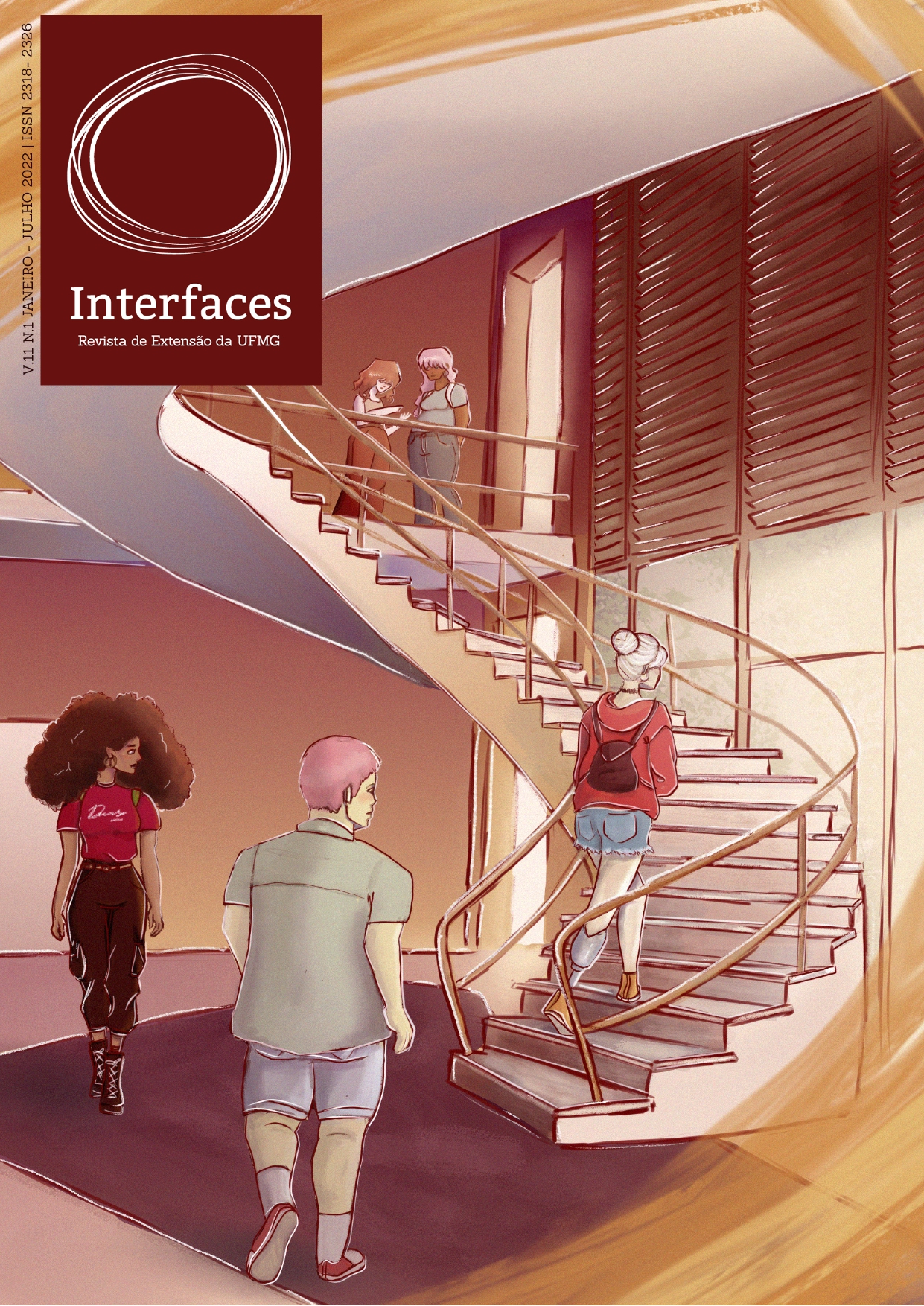SAÚDE OBSTÉTRICA DURANTE A PANDEMIA COVID-19
VÍDEOS EM SALA DE ESPERA
Palavras-chave:
Obstetrícia, Ensino à Distância, Pandemia por COVID-19Resumo
Diante da pandemia de COVID-19, foi necessário aprimorar formas virtuais de comunicação para atender às
medidas de isolamento social e manter práticas de promoção à saúde. Nesse contexto, foi desenvolvido o
projeto de extensão “Educação em Saúde: Exposição de Vídeos em Sala de Espera no Serviço de Pré-natal”
pela Universidade Federal de Minas Gerais (UFMG) com o objetivo de produzir conhecimento durante a espera ao atendimento pré-natal no Instituto Jenny de Andrade Faria. Foram elaborados vídeos didáticos com informações teóricas e vivências das pacientes, aproximando teoria e realidade seguindo pilares freireanos. O material foi desenvolvido de maneira predominantemente remota de novembro de 2020 a dezembro de 2021 e abordou temas como: direitos da gestante e processo de amamentação. Os impactos foram avaliados através de questionários de satisfação usando a escala de Likert e a análise estatística feita através do programa MINITAB-14. Os resultados mostram importante desinformação sobre o conhecimento dos direitos da gestante. Quanto à temática da amamentação, o projeto foi capaz de obter impacto educacional positivo. Percebe-se, portanto, a capacidade da comunidade acadêmica em promover saúde, de forma remota, através da extensão universitária.
Referências
A experiência brasileira em sistemas de informação em saúde. (2009). Biblioteca Virtual em Saúde MS. https://bvsms.saude.gov.br/bvs/publicacoes/experiencia_brasileira_sistemas_saude_volume1.pdf
Atenção básica cadernos de atenção ao pré-natal de baixo risco. (2012). Ministério da Saúde. https://bvsms.saude.gov.br/bvs/publicacoes/cadernos_atencao_basica_32_prenatal.pdf
Associados, P. A. (2016, 22 de fevereiro). Gestante: Saiba quais são os seus direitos. Jusbrasil. https://posocco.jusbrasil.com.br/noticias/307355310/gestante-saiba-quais-saos-os-seus-direitos#:~:text=%2D%20Fazer%20exames%20gratuitos%20de%20sangue,acompanhante%20na%20sala%20de%20parto.
Berlinguer, G. (1999). Globalização e saúde global. Estudos Avançados, 13(35), 21–38. https://doi.org/10.1590/s0103-40141999000100003
Brasil está entre os cinco países do mundo que mais usam internet. (2021, 26 de abril). Governo do Brasil. https://www.gov.br/pt-br/noticias/transito-e-transportes/2021/04/brasil-esta-entre-os-cinco-paises-do-mundo-que-mais-usam-internet#:~:text=Brasil%20est%C3%A1%20entre%20os%20cinco%20pa%C3%ADses%20do%20mundo%20que%20mais%20usam%20internet,-Pa%C3%ADs%20participou%20de&text=Com%2078%2C3%25%20de%20brasileiros,no%20uso%20di%C3%A1rio%20de%20internet.
Buss, P. M. (2000). Promoção da saúde e qualidade de vida. Ciência & Saúde Coletiva, 5(1), 163–177. https://doi.org/10.1590/s1413-81232000000100014
Durante a pandemia, consumo de internet dobra no Brasil. (2021). Olhar Digital. https://olhardigital.com.br/2021/05/13/coronavirus/durante-a-pandemia-consumo-de-internet-dobra-no-brasil/
Fernandes, M. C., Silva, L. M. S. d., Machado, A. L. G., & Moreira, T. M. M. (2012). Universidade e a extensão universitária: a visão dos moradores das comunidades circunvizinhas. Educação em Revista, 28(4), 169–194. https://doi.org/10.1590/s0102-46982012000400007
Gabriel, G. L., & Silva, J. H. d. (2020). Editorial (Lançamento da revista). Revista Educação, Pesquisa e Inclusão, 1(1), 4. https://doi.org/10.18227/2675-3294repi.v1i1.6398
Junqueira, A. R. d. S., & Souza, J. C. M. d. (2021). Contemporaneidade de Paulo Freire na educação de jovens e adultos no Brasil: um estudo bibliográfico. Revista Prática Docente, 6(2), Artigo e038. https://doi.org/10.23926/rpd.2021.v6.n2.e038.id1088
Marques, E. S., Cotta, R. M. M., & Priore, S. E. (2011). Mitos e crenças sobre o aleitamento materno. Ciência & Saúde Coletiva, 16(5), 2461–2468. https://doi.org/10.1590/s1413-81232011000500015
Medeiros, S. M. de, & Rocha, S. M. M. (2004). Considerações sobre a terceira revolução industrial e a força de trabalho em saúde em Natal. Ciência & Saúde Coletiva, 9(2), 399–409. https://doi.org/10.1590/S1413-81232004000200016
Pesquisa mostra que 82,7% dos domicílios brasileiros têm acesso à internet. (2021, 14 de abril). Governo do Brasil. https://www.gov.br/casacivil/pt-br/assuntos/noticias/2021/abril/mais-de-82-dos-domicilios-brasileiros-tem-acesso-a-internet#:~:text=A%20Pesquisa%20Nacional%20por%20Amostra,percentuais%20em%20rela%C3%A7%C3%A3o%20a%202018.
Pordeus Léon, L. (2021, 23 de agosto). Brasil tem 152 milhões de pessoas com acesso internet. Agência Brasil. https://agenciabrasil.ebc.com.br/geral/noticia/2021-08/brasil-tem-152-milhoes-de-pessoas-com-acesso-internet#:~:text=No%20Brasil%2C%20tem%20crescido%2C%20ano,a%20pandemia%20acelerou%20esse%20processo.&text=Pesquisa%20promovida%20pelo%20Comit%C3%AA%20Gestor,7%25%20em%20rela%C3%A7%C3%A3o%20a%202019.
Recomendações da OMS sobre atendimento pré-natal para uma experiência gestacional positiva: Resumo. (2016). Maternal and Child Survival Program. https://www.mcsprogram.org/wp-content/uploads/2018/07/ANCOverviewBrieferA4PG.pdf


